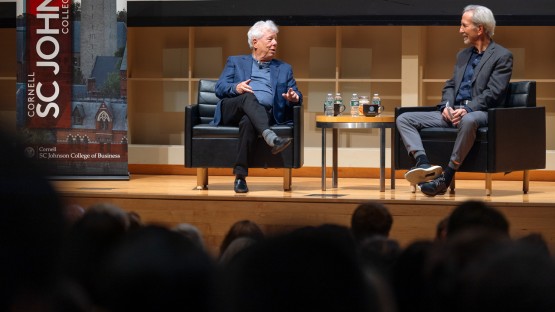
"Thaler won the Nobel Prize in Economics in 2017 for his research, much of it started at Cornell, on limited rationality, social preferences and lack of self-control. He is now the Charles R. Walgreen Distinguished Service Professor of Behavioral Science and Economics Emeritus at the University of Chicago's Booth School of Business. Welcoming Thaler to the stage, President Michael I. Kotlikoff said Thaler found inspiration for his research in experiences familiar to Cornellians, such as driving on one-way bridges, purchasing a snow shovel after a blizzard and buying corn at unstaffed roadside farm stands."
""Professor Thaler ... is widely considered the father of the research field of behavioral economics, a field founded upon the radical notion, previously not widely embraced by economists, that people are actually human," Kotlikoff said."
""Let me be clear," Thaler said, when the audience laughed. "I don't say that only having fun leads to a Nobel prize.""
Richard Thaler won the 2017 Nobel Prize in Economics for research on limited rationality, social preferences, and lack of self-control. He served on the faculty at Cornell from 1978 to 1995 and later held the Charles R. Walgreen Distinguished Service Professorship at the University of Chicago Booth School of Business. Thaler helped establish behavioral economics by integrating psychological insights into economic models and challenging the assumption of human rationality. His research drew inspiration from everyday experiences like one-way bridges, post-blizzard purchases, and unstaffed roadside farm stands. Collaborations elaborated how less-than-rational elements influence economic decision-making.
Read at Cornell Chronicle
Unable to calculate read time
Collection
[
|
...
]